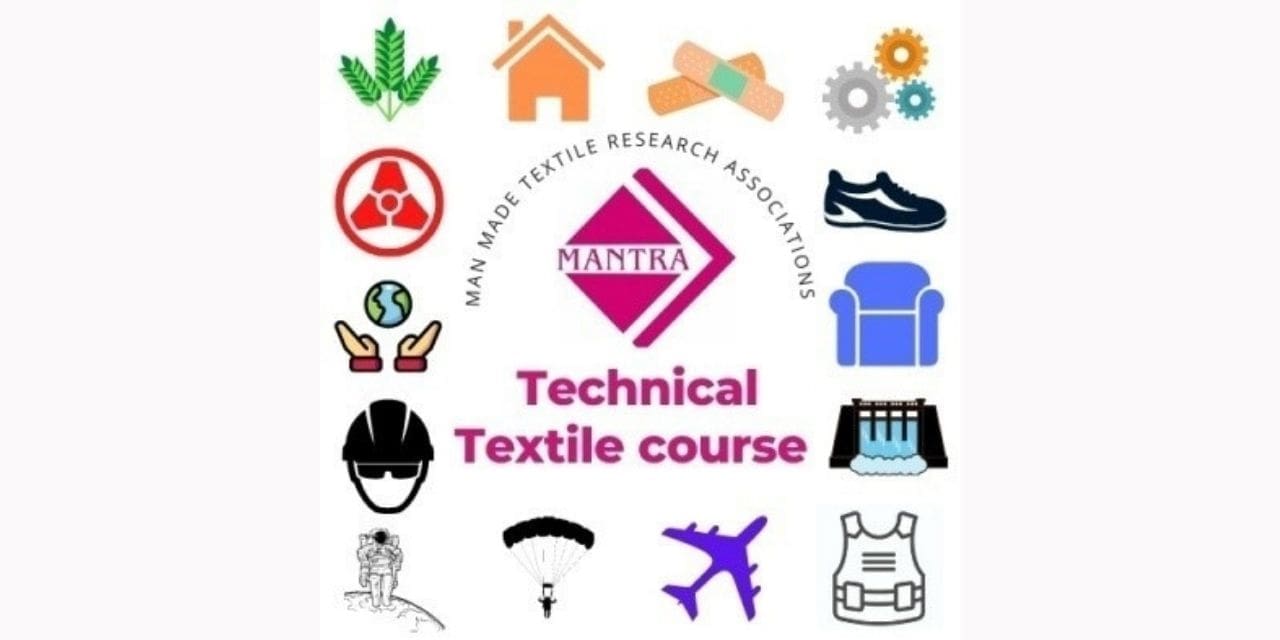MANTRA has started Short term course in Technical Textiles especially for entrepreneurs from 11th April, 2022. It will be two months course. Four days in a week with 2 hours sessions per day. Course will be conducted at Power Loom Service Centre, Pandesara (PSC). Timings: 9.00am to 11.00 am
Features of this course are that it will have practical, audio visual presentations, and it will include mill visits. Special guest lectures are also organised. MANTRA already has qualified pool of scientists who will take lectures.

The special feature of this course is it will have visual practical on high performance fibres, yarn and technical textile fabric also information on all the 12 segments of technical textiles will be covered during this course.
Segments:
1.BuildTech 2. Geotech 3. Sportstech 4. Mobiletech 5. Protech 6. Medicaltech 7. Packtech 8. Indutech 9. Agrotech 10. Oekotech 11. Clothtech 12. Hometech
With advance testing instrument in physical, analytical and Technical Textile with product development trail.
The course will be useful to young traders, processor, weavers who have Textile qualification and are eager to learn basics of Technical Textiles, Admission criteria for candidates is graduation preferred but not mandatory. Inauguration session was held on 11th April 2022 in presence of Shri Rajnikant Bachkaniwala: President, MANTRA, Shri Prafull. H. Gandhi: HON Secretary, MANTRA, Dr. P. P. Raichurkar: Director, MANTRA, Mr. R. S. Kulkarni: PSC Chief Coordinator and Mr. Dev Shah: Senior Scientific Officer, MANTRA.

SYLLABUBS
3 Month Training course for Chemical Testing in Textile and Processing Industry
Introduction of the course:
A training course, which covers theory and practical training in chemical testing of textile processing industry.
Prerequisite of the course: B.Sc degree
Outcome of the course: The students will identify themselves as professional in textile chemical laboratory after training.
Course content:
UNIT 1:
Processing techniques in Industry: Introduction to fibre, yarn and fabric; Processing technique- Scouring, Bleaching, Mercerization, dyeing, printing and Finishing along with different chemicals and auxiliaries involved.
UNIT 2:
Testing of Water, Oil and Coal: Different parameters of water, basic parameters of effluent water; Different parameters of Thermo pack oil, Antistatic oil and Coal analysis technique-related to textile industry
UNIT3:
Testing of Dyes and Finishing agents: Testing of Acids and Bases; Different parameters of dyes including strength and dispersion property; Testing of Thickeners including viscosity; Testing of finishing agent like polysol, binder
UNIT 4:
Testing of Fibres, yarn and fabric: Identification and Blend %; Moisture content, oil content, etc.
UNIT 5:
Performances Testing of Textiles: Different fastness properties like washing, rubbing, light and sublimation fastness;
UNIT 6:
Computer Colour Matching (Spectrophotometer): Basic of CCM, LAB and LCH value, Whiteness, Yellowness, Colour difference (DE), Colour strength of fabrics, etc.
6 Month Training course for Product development and Testing in Technical Textiles
Introduction of the course:
A training course, which covers theory and practical training in Product development and Testing in Technical Textiles.
Prerequisite of the course: Diploma/Degree in Textile
Outcome of the course: The students will identify themselves as professional in Technical textiles after training.
Course content:
UNIT 1:
Introduction to Technical Textile: Introduction to Technical Textile, Difference between apparel and Technical textile. Introduction to different sectors in Technical Textile; Fibre, Yarns, fabrics used in technical textiles; Different fabric structure including 3D weaving, Nonwovens and composites;
UNIT 2:
Product development: Introduction to products and Design; Customer requirements and Specifications; Product Architecture and Selection of material; Examples from Different sectors of technical textile
UNIT3:
Products from nonwovens: Introduction to Spunbond, Meltblown, Spunlace, Needlepunch, thermal bonding and chemical boding nonwoven; Different products made from nonwovens: medical non-woven fabric, Hygiene products; Face masks,
UNIT 4:
Coated and Laminated Structure: Introduction to coating and lamination, different products from coated and laminated fabric, products from warp knitted fabric, different composite structure.
UNIT 5:
Testing of Nonwovens: Different methods of production of Nonwoven fabrics, Advances in Nonwoven
Testing of coated fabric: Abrasion Resistance, Tensile strength of coated and non woven structure, Surface Wetting Resistance, Air Permeability, Water Permeability, Wetting, Vertical Flammability, Thermal Resistance
Testing of PPE kit and Face masks: Identification and Blend %; Moisture content, oil content, etc.
UNIT 6:
Case study: Practical exercise in group- Selection of 1 product-Analysis of required raw material: Process selection: Development of the product: performances testing: final report

